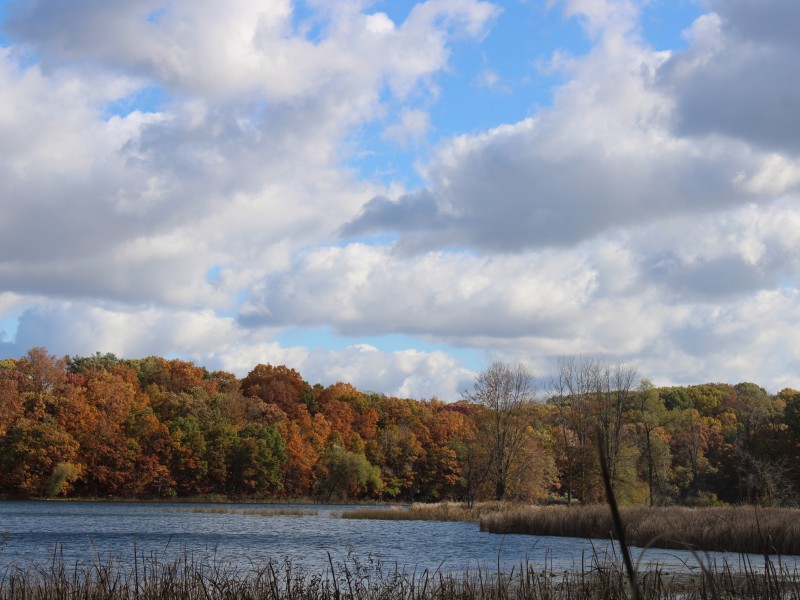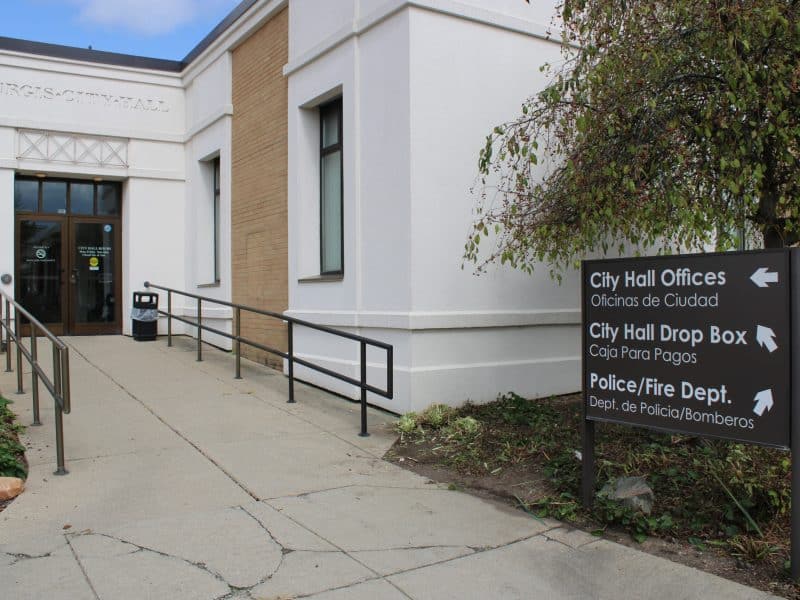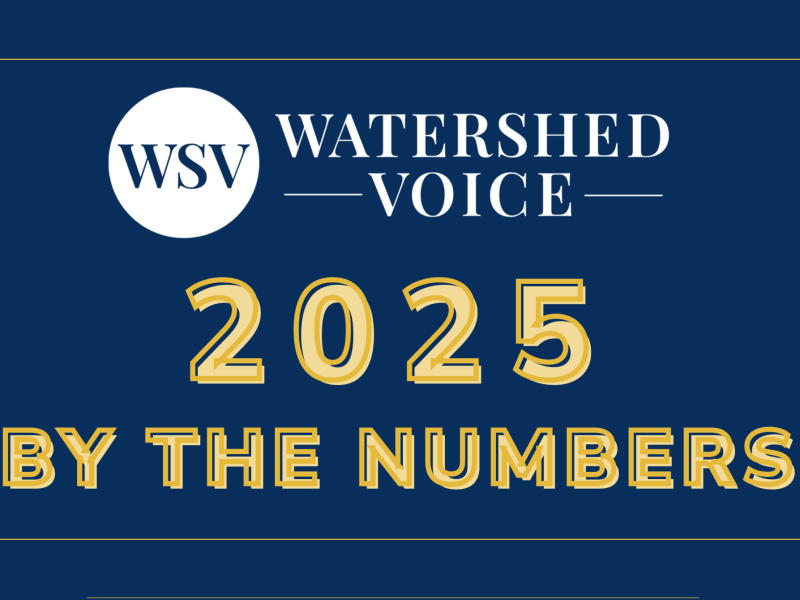‘I don’t want this for my family either’: Three Rivers commissioners, citizens discuss lead in water system
A near-capacity meeting Tuesday included a look at what’s ongoing, a reminder to not dismiss members of the public, and a brief discussion of why certain things contain lead.
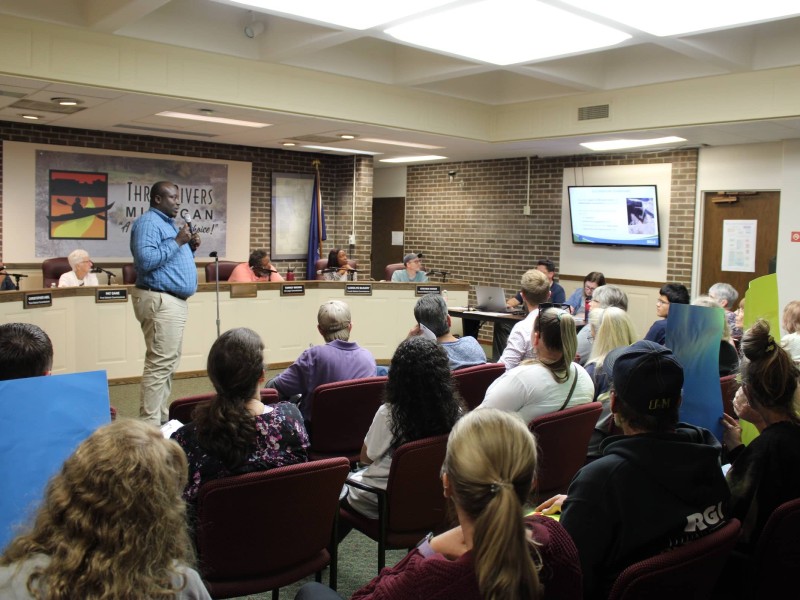
“The last thing you want, in your small hometown community, is not to be heard,” Kelly Houghton said Tuesday to the Three Rivers City Commission.
Prior to the meeting, Houghton had urged community members to attend. Strength in numbers has more of an impact than social media posts, she wrote. Three Rivers City Hall’s meeting room has a maximum capacity of 47 people, and the number of commissioners, city officials, and citizens present appeared to nearly meet that limit. Some brought signs saying “CLEAN WATER” and “THANKS EPA.”

Most of Tuesday’s audience came for an update on Three Rivers’ participation in the Environmental Protection Agency’s “Get the Lead Out” initiative. Get the Lead Out is designed to help fund the replacement of lead water service lines. Since August, attention has returned to the amount of lead being found in parts of Three Rivers’ water system, as well as the size of the confirmed results.
During a first round of testing in 2023, six out of 47 test sites had more than 15 parts per billion of lead in their water system. A second round of testing in 2023 had five out of 45 test sites exceeding 15 parts per billion. So far this year, six out of 44 test sites have had more than 15 parts per billion.
“It doesn’t matter if it’s one house out of 100 or 17 houses out of 100,” Houghton said. “It should be no houses. I’m glad that we’re moving in a positive direction, but the citizens are starting to feel very dismissed in this matter.”
Houghton was responding to a comment from Commissioner Torrey Brown.
“I don’t want to use the world ‘only,’ because any is bad, but 17 of the 136 houses that were tested over three phases contain more than 15 parts per billion, correct?” Brown asked. “So, the other hundred and something did not contain over 15 parts per billion.”
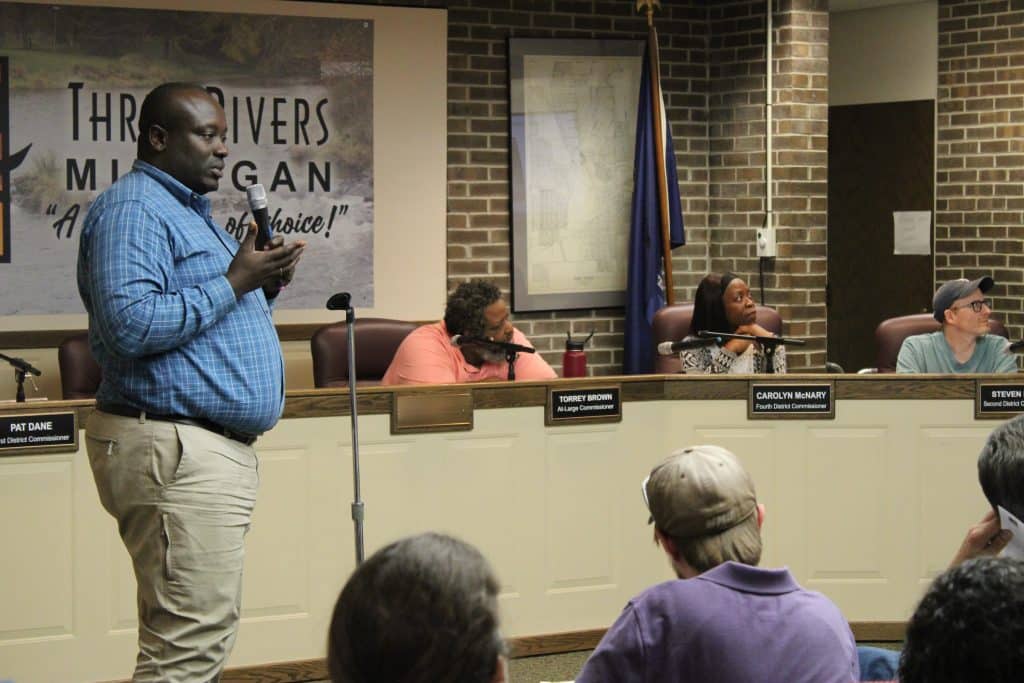
Several variables affect test results, according to Jennifer Bolt, a lead and copper rules specialist with the Michigan Department of Environment, Great Lakes, and Energy (EGLE). Officials are trying to conduct tests at homes with lead service lines and do so over multiple time periods.
“The idea is that we find the locations that have these high-risk sources and then we go to the same locations over and over again to get a trend and reduce the variables,” Bolt said.
While talking with Houghton, Brown further clarified his comment about lead being detected in water systems.”
“I don’t want to minimize it,” Brown said. “There shouldn’t be any. And then I said 17 out of 136. What my statement was (is that) not every single household has those numbers.”
Three Rivers’ most recent lead levels update was in early August. In that time, Brown said, there have been comments saying that the entire city has elevated lead levels and that it’s “worse than Flint.”
“Now, 15 of my teammates when I played college football were born and raised in Flint and still live in Flint. Flint’s levels were at 2,300 parts per billion. We’re at 15. It’s not comparable. No level is acceptable, but I’m trying to clarify for the misinformation that’s being spread around,” Brown said.
Houghton’s initial comments included urging the Three Rivers City Commission to not dismiss its citizens. Brown’s response included his saying that all commission members live in Three Rivers and use the same water system as the public.
“We’re all going through this with you guys,” Brown said. “There isn’t a special line that runs through the commissioners’ houses. I don’t want this for my family either.”
Jean-Pierre Nshimyimana, PhD, a lead service line replacement specialist with EGLE, gave an update on Get the Lead Out’s work in Three Rivers. It includes:
- Providing technical assistance to the city in developing an inventory of lead and non-lead service lines.
- Taking part in door knocking scheduled from Tuesday, October 1-Friday, October 4, in order to verify the homes that have lead service lines.
- Creating a lead service line replacement policy and plan, along with a community engagement plan. Neither of these action items have been scheduled as of Tuesday.
- Developing an ordinance that can be used for mandating the identification and removal of service lines that require replacement. This also hasn’t been scheduled as of Tuesday.
- Assisting Three Rivers with identifying sources of funding for the lead service line replacements. This is ongoing as of Tuesday.
Mayor Tom Lowry urged concerned residents to get their homes tested for lead. If a house was built before 1978, there is what Lowry called a very good chance that it has a lead service line or that lead solder was used for copper lines.

Lowry and Bolt also discussed nearly 50 years of revised national requirements for houses. These include lead-based house paint being banned in 1978, lead service lines and solder being banned in 1988, and lead-free kitchen and bathroom fixtures being required in 1996, with the standards being raised in 2014.
“This is not a Three Rivers or a six communities in Michigan issue,” Lowry said. “It (affects) the entire nation. Somebody didn’t do something wrong in Michigan or in Three Rivers. It’s just the age of your house, and nobody knew this would be a problem 100 years ago, or even 50 years ago.”
While Michigan has made paying for lead line replacement an issue for cities, Lowry said that “realistically, Congress knows they’re going to have to fund it.”
Commissioner Chris Abel shared his optimism about Get the Lead Out. Abel talked about how he has voted against Three Rivers’ two most recent annual budgets because he disagreed with the idea of raising water service bills.
“I just personally don’t understand why we’re raising the cost of the water when it’s not suitable to drink. Also, we had a huge raise several years ago in order to create funding to replace those service lines. It’s just really not happening at a rapid rate at all,” Abel said.
Every commissioner and city leader takes the water issue seriously, according to Abel.
“We want to get it clean as much as everybody else does,” he said. “I really am encouraged with this program.”
Commissioner Lucas Allen was absent from Tuesday’s meeting.
The next Three Rivers City Commission meeting is scheduled for 6 p.m. Tuesday, October 15.
Frank Stanko is a staff writer for Watershed Voice.

